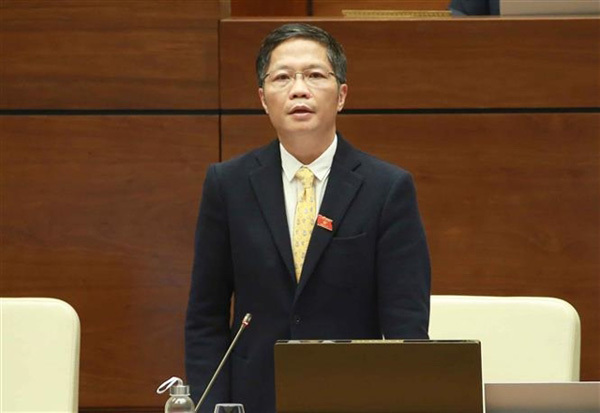Nguyen Xuan Cuong, as part of the 14th NA’s ongoing eighth session.
According to Cuong, in October 2017, the EC issued the warning to Vietnam due to the country’s failure to demonstrate sufficient progress in the fight against illegal, unreported and unregulated (IUU) fishing.
Vietnam has focused on promoting efforts and implementing action programmes to remove the “yellow card”, he stressed.
Cuong said after two years implementing many measures, Vietnam is recognised as no longer violating illegal fishing acts in Pacific and island nations.
On November 6, the Eurpepan Union (EU) sent a delegation to Vietnam for the second inspection of the implementation of the EC's recommendations to combat IUU violations.
Regarding ways to attract businesses to invest in agricultural production and rural development from a question posed by Deputy Pham Thu Trang from Quang Ngai Province, the minister said co-operation between businesses and farmers played a very important role in large-scale production.
“For the last three years, the number of enterprises investing in agricultural production has more than tripled, from 3,000 to over 11,000 across the country from producing to processing and consumption,” Cuong told the NA.
“Many large-scale businesses have been attracted by the increasing value of agricultural production,” the minister said.
However, the number of businesses investing in the field was still behind expectations, he admitted.
The ministry planned to develop measures to improve the situation, Cuong said.
Deputy Nguyen Ngoc Phuong from the central province of Quang Binh asked about the impacts of climate change on rural development.
The minister said that over the last ten years, the new rural development programme had made progress but had yet to meet the requirements of creating an environment for large-scale and co-operative production, re-structuring and advanced technological applications.
These issues would be reviewed in order to find answers, he said.
Referring to the impacts of climate change, Cuong said that Vietnam was one of the countries most vulnerable to the global phenomenon.
“In the past three years, mountainous regions have been hit by flash floods and landslides,” he said, so sustainable investment to respond to climate change was a priority.
The minister said the country had focused on restructuring the agricultural sector.
“With total cultivation covering 10 million hectares, the country had produced 4.5 million tonnes of food, 5.5 million tonnes of meat and 8 million tonnes of fish,” he said.
However, the biggest shortcoming was processing and consumption.
“If this is not fixed, the problem of ‘bumper crops and low prices’ will continue,” he said.
Pepper was an example. In recent years, in Tay Nguyen (Central Highlands) provinces, crops have been overproduced.
Vietnam produces 350,000 tonnes of pepper every year, accounting for 60 per cent of the global output.
"That was too much," Cuong said, adding that in the future, solutions were needed to re-organise production in terms of production chains and enhancement of processing and consumption.
Commercial issues
 |
| Minister of Industry and Commerce during his Q&A session at the National Assembly yesterday. — VNA/VNS Photo Doan Tan |
In the afternoon, Minister of Industry and Commerce Tran Tuan Anh answered questions raised by deputies.
Opening the session, Bac Can Province Deputy Phuong Thi Thanh asked the minister to explain the slow progress of a power project and measures to improve the situation.
Minister Tran Tuan Anh admitted the slow progress.
The project was initially costed at VND30 trillion (US$1.3 billion) funded by the World Bank and the European Union. In late 2017 and early 2018, that money dried up due to the high rate of public debt in the country, Anh said.
About 18 per cent of the capital had been disbursed so far, he said.
To resolve the issue, the minister they were looking for other sources of funding.
Deputy Pham Van Hoa from Dong Thap Province raised concerns about the manufacturing of fake and low-quality products, especially those made in China and disguised as Vietnamese goods.
On the other hand, Vietnam’s products exported to the EU and US markets were in danger of being charged with origin fraud and tax evasion, the deputy said.
“Where does the responsibility lie?” the deputy asked.
According to the minister, the Government had big plans for trade defence and origin fraud control, as well as illegal export activities in Vietnam.
“We have informed the Ministry of Finance and customs officials about the risks,” Anh said.
Bilateral and multilateral trade agreements had helped increase competitiveness, but some products were being sneaked under the radar to avoid tariff barriers.
Products such as aluminum, electronic devices, textiles and garments, footwear and wooden products were all under surveillance, he said.
Responding to Hoa’s question about the ministry’s responsibility to censor products from China featuring the illegal nine-dash line in the East Sea, the minister said the ministry had decided to confiscate a luxury car installed with a GPS displaying the line.
The Ministry of Industry and Commerce, Ministry of Finance, Vietnam Customs, Ministry of Culture, Sport and Tourism, and Ministry of Information and Telecommunications would review the incident and prevent anything else from happening in the future, he said.
The minister will continue his Q&A session today.
VNS
 NA deputies yesterday asked about measures to remove the European Commission (EC)’s ‘yellow card’ warning on Vietnam’s fisheries sector during the question & answer (Q&A) session to Minister of Agriculture and Rural Development
NA deputies yesterday asked about measures to remove the European Commission (EC)’s ‘yellow card’ warning on Vietnam’s fisheries sector during the question & answer (Q&A) session to Minister of Agriculture and Rural Development